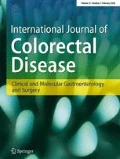Abstract
Purpose
After curative resection of stage II colon cancer, adjuvant chemotherapy with 5-fluorouracil/leucovorin (FL) or capecitabine is selectively recommended. However, there is little evidence of the effect of capecitabine on oncologic outcome in geriatric patients with stage II colon cancer compared to that of FL. The aim of this study was to determine the difference in recurrence-free survival (RFS), cancer-specific survival (CSS), and overall survival (OS) in patients older than 70 years of age with stage II colon cancer receiving capecitabine and FL.
Methods
Patients over 70 years of age diagnosed with primary pathologic stage II colon cancer at the Seoul National University Hospital from January 2005 to December 2015 were included. A prospectively collected database was analyzed retrospectively. Patients were separated into an FL group and a capecitabine group. The primary outcomes were RFS, CSS, and OS.
Results
Of the 154 included patients, 96 patients received FL and 58 patients received capecitabine. There was no difference between the two groups in RFS, CSS, or OS (p = 0.763, p = 0.221, and p = 0.470, respectively) as measured by Kaplan–Meier analysis with log-rank test. Administration of capecitabine as compared to FL was not a factor affecting RFS (hazard ratio [HR] 0.503, 95% confidence interval [CI] 0.145–1.745), CSS (HR 1.519, 95% CI 0.348–6.629), or OS (HR 0.941, 95% CI 0.290–3.053) on multivariable analysis.
Conclusions
Capecitabine is a safe regimen in terms of oncologic outcomes compared with FL in older patients with stage II colon cancer.




Similar content being viewed by others
References
Benson AB 3rd, Venook AP, Cederquist L, Chan E, Chen YJ, Cooper HS et al (2009) Colon cancer, version 1.2017, NCCN clinical practice guidelines in oncology. J Natl Compr Cancer Netw 15:370–398
Tournigand C, Andre T, Bonnetain F, Chibaudel B, Lledo G, Hickish T et al (2012) Adjuvant therapy with fluorouracil and oxaliplatin in stage II and elderly patients (between ages 70 and 75 years) with colon cancer: subgroup analyses of the Multicenter International Study of Oxaliplatin, Fluorouracil, and Leucovorin in the Adjuvant Treatment of Colon Cancer trial. J Clin Oncol 30:3353–3360. https://doi.org/10.1200/JCO.2012.42.5645
Twelves C, Wong A, Nowacki MP, Abt M, Burris H 3rd, Carrato A et al (2005) Capecitabine as adjuvant treatment for stage III colon cancer. N Engl J Med 352:2696–2704
Siegel RL, Miller KD, Fedewa SA, Ahnen DJ, Meester RGS, Barzi A, Jemal A (2017) Colorectal cancer statistics, 2017. CA Cancer J Clin 67:177–193. https://doi.org/10.3322/caac.21395
Hutchins LF, Unger JM, Crowley JJ, Coltman CA Jr, Albain KS (1999) Underrepresentation of patients 65 years of age or older in cancer-treatment trials. N Engl J Med 341:2061–2067
Benson AB 3rd, Schrag D, Somerfield MR, Cohen AM, Figueredo AT, Flynn PJ et al (2004) American Society of Clinical Oncology recommendations on adjuvant chemotherapy for stage II colon cancer. J Clin Oncol 22:3408–3419
Schmoll HJ, Van Cutsem E, Stein A, Valentini V, Glimelius B, Haustermans K et al (2012) ESMO Consensus Guidelines for management of patients with colon and rectal cancer. A personalized approach to clinical decision making. Ann Oncol 23(10):2479–2516. https://doi.org/10.1200/JCO.2004.05.063
Reha J, Mukkamalla SKR, Rathore R, Somasundar PS (2018) Adequate lymph node evaluation in the elderly is associated with improved survival in patients with stage I-III colon cancer: a validation study using the National Cancer Data Base. Eur J Surg Oncol 44:148–156. https://doi.org/10.1016/j.ejso.2017.11.005
Poeschl EM, Pollheimer MJ, Kornprat P, Lindtner RA, Schlemmer A, Rehak P et al (2010) Perineural invasion: correlation with aggressive phenotype and independent prognostic variable in both colon and rectum cancer. J Clin Oncol 28:e358–e360. https://doi.org/10.1200/JCO.2009.27.3581
Cienfuegos JA, Martinez P, Baixauli J, Beorlegui C, Rosenstone S, Sola JJ et al (2017) Perineural invasion is a major prognostic and predictive factor of response to adjuvant chemotherapy in stage I-II colon cancer. Ann Surg Oncol 24:1077–1084. https://doi.org/10.1245/s10434-016-5561-0
Huh JW, Kim HR, Kim YJ (2010) Prognostic value of perineural invasion in patients with stage II colorectal cancer. Ann Surg Oncol 17:2066–2072. https://doi.org/10.1245/s10434-010-0982-7
Tan WP, Talbott VA, Leong QQ, Isenberg GA, Goldstein SD (2013) American Society of Anesthesiologists class and Charlson’s comorbidity index as predictors of postoperative colorectal anastomotic leak: a single-institution experience. J Surg Res 184:115–119. https://doi.org/10.1016/j.jss.2013.05.039
Sargent DJ, Marsoni S, Monges G, Thibodeau SN, Labianca R, Hamilton SR et al (2010) Defective mismatch repair as a predictive marker for lack of efficacy of fluorouracil-based adjuvant therapy in colon cancer. J Clin Oncol 28:3219–3226. https://doi.org/10.1200/JCO.2009.27.1825
Funding
This research was supported by the Basic Science Research Program through the National Research Foundation of Korea (NRF) funded by the Ministry of Education (No. NRF-2017R1D1A1B03036191).
Author information
Authors and Affiliations
Corresponding author
Ethics declarations
This study was conducted with the approval of the institutional review board (IRB) of Seoul National University Hospital. Requirement for consent was waived with permission from the IRB. All procedures performed in studies involving human participants were in accordance with the ethical standards of the institutional and/or national research committee and with the 1964 Helsinki declaration and its later amendments or comparable ethical standards.
Conflict of interest
The authors declare that they have no conflict of interest.
Additional information
Publisher’s note
Springer Nature remains neutral with regard to jurisdictional claims in published maps and institutional affiliations.
Rights and permissions
About this article
Cite this article
Lee, Ky., Park, J.W., Lee, Ky. et al. Oncologic outcomes after adjuvant chemotherapy with capecitabine compared to 5-fluorouracil/leucovorin for geriatric stage II colon cancer: a retrospective cohort study. Int J Colorectal Dis 34, 629–639 (2019). https://doi.org/10.1007/s00384-019-03237-x
Accepted:
Published:
Issue Date:
DOI: https://doi.org/10.1007/s00384-019-03237-x




